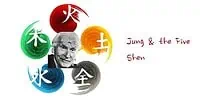The Five Shen of Chinese Medicine and Freud’s Psychoanalytic Theory are like two sides of the same coin, each providing unique insights into the human psyche and its intricacies. By exploring the connections between these two systems, we can unlock a wealth of knowledge about human behaviour, motivation, and emotions. It’s like having a secret key that unlocks the mysteries of the mind.
The Five Shen, or “spirits,” offer a holistic view of the human experience, taking into account not only the physical body but also the emotional and spiritual aspects of being. Freud’s Psychoanalytic Theory, on the other hand, delves deep into the unconscious mind, exploring the hidden motivations and desires that drive our behaviour. By combining these two systems, we can gain a more complete understanding of ourselves and others, and unlock the potential for emotional and psychological well-being.
Freud’s Psychoanalytic Theory
In Sigmund Freud’s Psychoanalytic Theory the id (instinctual drives), the ego (rational and conscious decision-making), and the superego (moral and ethical values) are three components of the human psyche that shape our behaviour and decision-making.
The id is the primal part of the psyche, reminding us to seek pleasure and satisfaction.. The id is like a hungry beast, always seeking instant gratification.
The ego is the wise mediator, balancing the id and the external world. Our primitive desires can be overwhelming, but the ego helps us make rational decisions.
The superego serves as the moral compass, guiding behavior according to societal expectations. The superego keeps us in line with our moral values and principles.
We all have a little bit of each component within us. But it’s important to find a balance between them. Otherwise, we risk becoming too impulsive or too rigid.
Understanding these components can help us better understand our own behavior. We can recognize when our id is taking over, or when our superego is being too strict. And we can strive to find a healthy balance between them. By recognizing our unconscious desires and impulses, we can learn to control them and make decisions based on the reality principle.
Mapping the Five Shen with Freud’s Psychoanalytic Theory
The Five Shen (五神, Wǔshén) in Chinese Medicine symbolise five facets of an individual’s spiritual essence or consciousness, each linked to one of the five primary organ systems: the Heart (Shen), the Liver (Hun), the Spleen (Yi), the Lungs (Po), and the Kidneys (Zhi). The Five Shen are thought to influence a person’s emotional and mental well-being, with their balance being critical for overall health.
Heart (Shen): The Conscious Mind and the Superego
The Shen embodies the cognitive and emotional dimensions of a person’s consciousness, akin to the Freudian concept of the conscious mind. A balanced Shen enables a person to maintain emotional stability and self-awareness, contributing to a strong sense of moral and ethical responsibility. It governs mental processes such as thought, memory, and awareness.A balanced Shen enables a person to possess a clear and focused mind and maintain emotional stability, reflecting a harmonious interplay between the conscious and unconscious realms, promoting adherence to the superego’s values and ideals.
Liver (Hun): The Ethereal Soul and the Interaction of Id, Ego, and Superego
The Hun, is the aspect of the soul responsible for spiritual awareness, intuition, and the ability to access wisdom from one’s ancestors or higher consciousness. It can be likened to Freud’s exploration of the unconscious mind through dreams and as a bridge between the different components of Freud’s Psychoanalytic Theory. A balanced Hun allows a person to access their inner wisdom, intuition, and creativity, fostering personal growth and self-discovery. The Hun’s connection to the divine and the deep wisdom contained within higher consciousness can guide the interaction of the id, ego, and superego, ensuring harmony and balance within the psyche.
Spleen (Yi): The Intellect and the Ego
The Yi, associated with rational thinking, analysis, and problem-solving, can be compared to Freud’s concept of the ego. A balanced Yi allows a person to engage in effective communication, problem-solving, and decision-making, which are essential functions of the ego. The Yi enables a person to think clearly, make sound decisions, and maintain focus on their goals, reflecting the ego’s role in mediating between the id’s desires, the superego’s values, and the external environment’s demands.
Lungs (Po): The Corporeal Soul and the Id
The Po, representing the physical aspects of a person’s consciousness and governing the body’s instincts and reflexes, bears similarities to Freud’s concept of the id. The Po is responsible for the body’s reflexes and instincts, which share similarities with the unconscious desires and impulses of the id. Closely tied to the breath and responsible for the regulation of the body’s vital energies, a balanced Po allows a person to maintain a strong connection between their body and mind, ensuring physical health and vitality, while keeping primal urges in check.
Kidneys (Zhi): The Willpower and the Ego
The Zhi, representing willpower and determination, align with the ego’s role as a mediator and rational decision-maker. A balanced Zhi enables a person to persevere and make rational choices, much like the ego’s function of balancing the id’s demands with the external world’s realities. Responsible for the ability to endure hardships, and overcome obstacles, a balanced Zhi enables a person to stay motivated and focused on their purpose, even in the face of adversity, which reflect also a relationship with the superego’s role in regulating moral and ethical standards.
In the light of Freudian psychoanalysis, the Five Shen can be interpreted as manifestations of the dynamic interplay between the conscious and unconscious mind, as well as the id, ego, and superego. By exploring the relationships between these aspects of the human psyche, individuals can gain insights into their emotional and mental well-being, fostering a balanced and integrated self.
Conclusion
The connection between the Five Shen of Chinese Medicine and Freud’s Psychoanalytic Theory highlights the potential for a holistic, integrated approach to understanding the human psyche. By examining the interplay between these two frameworks, individuals and practitioners can address various aspects of human emotions, motivations, and consciousness, promoting overall emotional and psychological well-being.
The Five Shen and Freud’s Psychoanalytic Theory complement one another, offering a comprehensive perspective on human motivation, behaviour, and emotional regulation. By appreciating the interconnectedness of ancient wisdom and modern psychological theories, we can deepen our understanding of the human psyche and facilitate healing and growth in a diverse and interconnected world.
It’s essential to mention that this viewpoint is purely my own. In line with the Five Element theory, every aspect of us contains the presence of all elements. This means we can notice elements of each Shen that may be related to specific archetypes. I’ve put forth a theoretical framework and am eager to initiate a conversation with you. You might agree or disagree – I’m curious to hear your thoughts!






